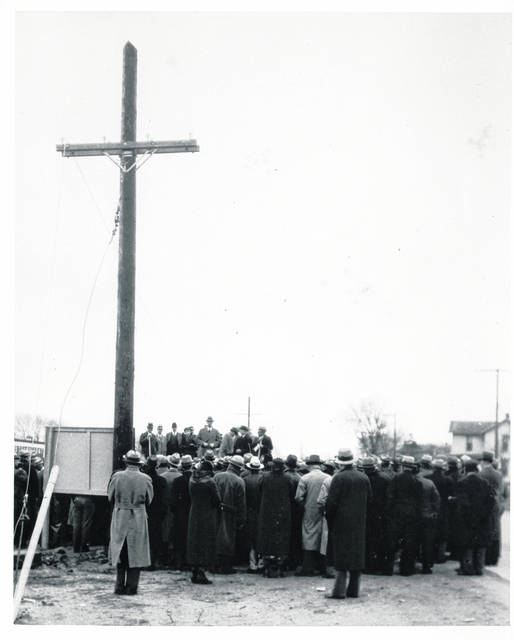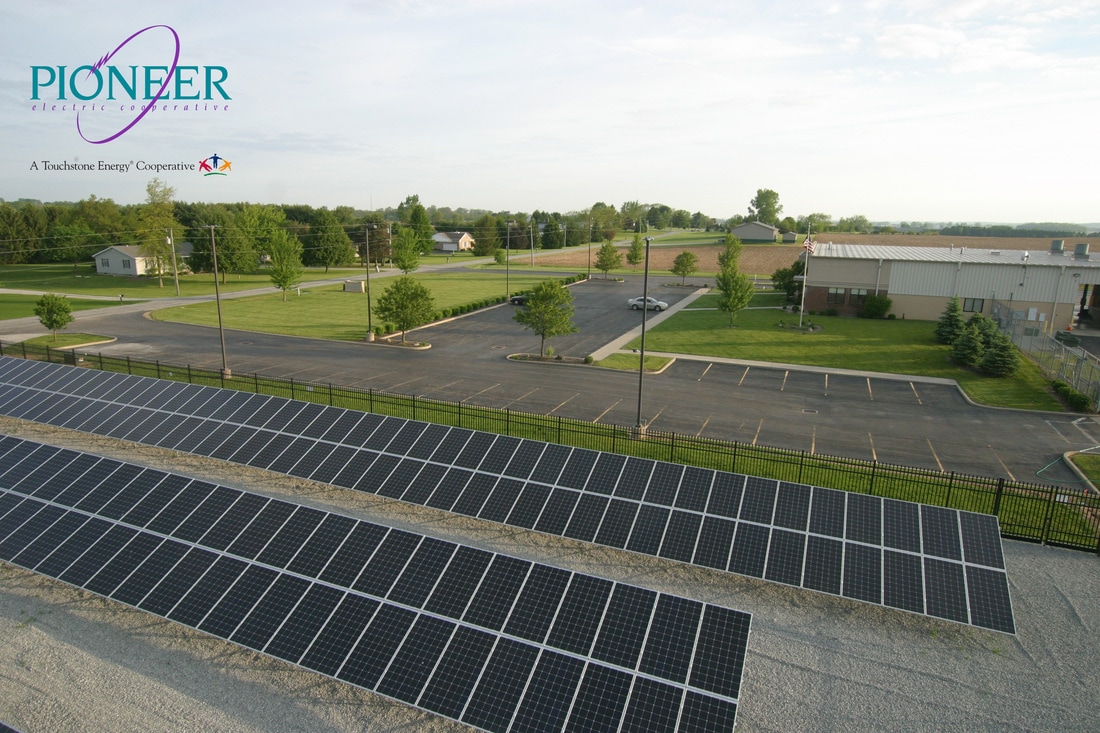On November 14, 1935, 500 people, mostly rural residents, gathered in Piqua to celebrate the groundbreaking and erection of the first electric cooperative pole in the nation. That pole would go on to support 193 miles of power line and bring electricity to 700 rural farms with the help of Miami Rural Electric Cooperative, Inc. The newly constructed lines served the three county cooperatives — Miami, Shelby and Champaign — which would merge six months later to become Pioneer Rural Electric Cooperative, Inc., a utility company owned by the people it served. It would be another six months after the initial pole setting that the first home, electrified by Pioneer, would see the lights come on.
“We are thankful to be celebrating 85 years of providing electric service to our area,” said Pioneer President and CEO Ron Salyer. “We have a deep appreciation for our membership and the strong trustees, leadership, and employees who have helped shaped Pioneer along the way.” The formation of the electric cooperative ultimately made the rural way of life easier, from making daily tasks more efficient to simply having light when it would otherwise be dark. That innovative spirit is not only a part of the co-op’s past but continues to play a role in the way Pioneer operates today. Pioneer was an early tester and adopter of the radio-controlled load management program as well as the Supervisory Control and Data Acquisition (SCADA) system. The SCADA system, which monitors and controls field devices remotely, was implemented in 1987 and continues to be a valuable tool today. Consistently being on the progressive edge of technology, compared to other cooperatives, has provided Pioneer the opportunity to have input on software distributed to other cooperatives throughout the country. Throughout the past 85 years, Pioneer has built a tradition of providing safe, high quality, and responsive service to nearly 17,000 members in its primary territory of Champaign, Miami, and Shelby counties, as well as portions of the eight surrounding counties. The cooperative is headquartered in Piqua and has a district facility in Urbana. “Our mission has always been to provide safe, high quality, reliable electric service to our member-consumers,” said Salyer. “We continue to hold Pioneer to a high standard, which is what our members expect and deserve.”
http://www.springfieldnewssun.com/news/business/economy/champaign-county-seeks-new-partnership-for-economi/ngM2m/
The city of Urbana and Champaign County are asking the private sector to help raise money for economic development efforts in the county. As part of that, Champaign County plans to quadruple what it currently spends on economic development, County Commissioner Steve Hess said. Currently Marcia Bailey works 28 hours a week as the economic development director for the county and city. “It is a full-time business being run part-time,” Urbana Mayor Bill Bean said. Local leaders now hope to create a partnership between the county, city and private sector called the Champaign Economic Partnership, or CEP. “Economic development to me is one of the most single important issues, not only in Urbana, but Champaign County,” Bean said. Bean and Hess presented the partnership proposal on Tuesday to representatives from the banking, education, real estate, manufacturing and health care fields, and leaders from Champaign County townships and villages. Champaign County cut its budget for economic development in 2011. Hess voted against the cuts in 2011, but said he believes the county will re-dedicate $1 from every conveyance fee now used for the general fund budget back into an economic development fund. The county was spending $25,000 a year on economic development and believes the new conveyance fees will raise an additional $75,000 a year. Champaign County said it will give $50,000 to the CEP and save the other $50,000 for special projects. The city has pledged to give $50,000 as well to the partnership and hopes the private sector will match the government agencies, Bean said. The CEP is expected to be fully functioning by Jan 1. 2015, Bailey said. One of the businesses that was a catalyst for the partnership was Pioneer Electric, Bailey said. Pioneer hosted the presentation and was the business to donate to the CEP, giving $15,000. “We believe strongly in economic development,” Pioneer Electric CFO Aaron Stallings said. Pioneer benefits when any new business comes into the county, he said, because it will use the company’s power or their employees will use the electricity. The money raised by the partnership will go toward hiring staff, boosting Urbana’s web presence and recruiting businesses and employees, Bailey said. Rick Finkbine, executive vice president of Sarica Manufacturing, said his company spends a lot of time recruiting and educating employees about manufacturing jobs. He said he hopes the partnership will help with those efforts. “Manufacturing is a different industry than many people perceive it to be,” Finkbine said. “We spend a lot of time recruiting, talking to people about the new kind of manufacturing, which is much more modern and clean than they may believe.” Sarica would be interested in being part of the partnership, he said, because more companies in Urbana can benefit everyone. “We would like to shorten the supply chain. The longer the supply chain the more costly it is. The more inflexible it is. Additional business around us would benefit us on a supply chain,” Finkbine said. “Obviously it would open up opportunities for additional customers also.” http://www.springfieldnewssun.com/news/news/local/champaign-county-to-change-economic-development-mo/nmPB4/
By Matt Sanctis Champaign County’s economic development model could change this week under a plan that will include cooperation and funding from the county, city of Urbana, private businesses and other entities. Urbana City Council members recently approved the proposal, and the Champaign County commissioners are expected to finalize the deal Thursday. The proposal has been in the works for almost a year, and if approved, will eventually create a one-stop shop for business services. It would include offices for economic development, the Champaign County Chamber of Commerce, the Small Business Development Coalition and other entities under a single roof. The new structure could take effect about 30 days after the county finalizes the agreement. The Community Improvement Corporation of Champaign County will take over control of economic development and will be called the Champaign Economic Partnership, said Steve Hess, Champaign County Commissioner. The city has provided the brunt of the funding in recent years after the economy soured. But the county and other entities will now chip in additional resources to attract and retain business, Hess said. “We felt like the county needed to step up and help with the effort more than what we were,” he said. The city will continue to provide about $50,000 per year in funding for economic development, and Champaign County will now donate an additional $50,000 annually, paid for through a portion of county conveyance fees that until recently went instead to the general fund. The Pioneer Electric Cooperative and DP&L will also spend $15,000 each to fund the entity. The commissioners raised conveyance fees, added to each county real estate sale, by $2 in 2009, with a portion being used to pay for economic development. But at the worst of the recession, that money was diverted back to the county’s general fund to hold off other cuts. “I said at the time I saw that as a temporary thing,” Hess said. “Once things loosened up a little bit financially for us I wanted to push to get it put back on.” About $1.30 from Champaign County’s $4 conveyance fee will fund its portion of the effort. Other local businesses that are interested will also be able to donate to the organization. Marcia Bailey, who previously worked for the city, would continue to lead economic development efforts locally. She would report to an 18-member board governing the Champaign Economic Partnership. That board would include local government officials, school leaders and private businesses, among others. Local officials organized the new structure based on a similar model in Shelby County, which has involved cooperation from Sidney and Shelby County for more than two decades. “We feel that’s a sustainable model,” Hess said. “It’s a wheel that’s already been invented and it’s worked pretty well in Shelby County, and I feel like it ought to work in Champaign County, too.” Shelby County’s program started in 1983, during a period of high unemployment and inflation, said Mike Dodds, executive director of the Sidney-Shelby Economic Partnership. Several area businesses at the time wanted to be more aggressive in competing for business, and the result so far has been effective, Dodds said. One of the benefits is it allows both Sidney and Shelby County to pool resources instead of competing, Dodds said. Business owners in Urbana said they are optimistic the change will benefit existing businesses as well. Pam Bowshier, who owns a small business in downtown Urbana, moved to the area 16 years ago from Florida and remembers the majority of downtown shops were vacant at that time. “Shop window after shop window was just empty,” she said. Over time that has changed, and she hopes the new coalition will enhance that growth and development — especially for tourism and attraction to the area. Bowshier’s local shop, Cosmic Charlie’s Breads and Threads, 116 Scioto St., has had a storefront downtown for the past year. As a small business owner, she was excited to hear the county, city and private enterprises were uniting in the venture, she said. The group could create more opportunities together than each could do individually. “We need everyone working together,” Bowshier said. If successful, the new model in Champaign County will benefit schools, existing businesses and local government, said Ron Salyer, CEO of Pioneer Electric. The company has been involved since efforts began to find a more effective plan to pay for economic development. “One thing we think is really neat about it is the board is made up of 60 percent private businesses, and 40 percent public entities,” Salyer said. “That way, we have a pretty nice balance between the private focus as well as the public and it gets everyone on the same page when opportunities come to the county.” Pioneer has a significant investment in electric infrastructure in the county, so attracting new businesses helps build a stronger base of customers, Salyer said. The Champaign Economic Partnership is already looking for suitable office space in Urbana that could house several agencies under one roof, Bailey said. Creating a single location for business development would allow local organizations to share resources and time, and make things easier for businesses who are interested in expanding or relocating to the area. The money the county raises from its conveyance fees could generate between $90,000 to $100,000 per year, Hess said. After the county’s initial $50,000 investment, the rest could go toward other needs like hiring an additional part-time staff member to assist Bailey, setting up a revolving loan fund or funding a separate project. The money must be spent for economic development purposes. Although it was a long process, the new organization’s board members have so far shown they are committed to making sure the new model works, Urbana Mayor Bill Bean said. “We’ve had our ups and downs with economic development in Champaign County over the years,” Bean said. “Yes, this is new; but nothing ventured, nothing gained. Right now we’ve got people interested in doing what’s right for the communities.” Staying with the story The Springfield News-Sun is committed to covering business and the economy in Clark and Champaign counties. For this story, the paper spoke to local government officials and private businesses about this year-long effort. By the numbers $50,000 — Amount Urbana and Champaign County are donating $15,000 — Donation from Pioneer Electric and DP&L $90,000 to $100,000 — Estimated amount county conveyance fees could raise for economic development 18 — Board members on the Champaign Economic Partnership |
Archives
February 2024
Categories
All
|
|
CEP Office Location:
40 Monument Square, Suite 306 Urbana, Ohio 43078 937-653-7200 |
All drone photography courtesy of Jassen Dobyns of UAVisions LLC. Additional photography courtesy of Dave Millner of the Champaign Camera Group.
Website by Berry Digital Solutions, LLC Urbana, Ohio |
Click on the logos for more information.




 RSS Feed
RSS Feed










